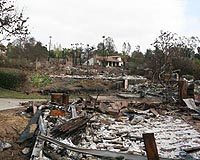| . |  |
. |
Portland OR (SPX) Jul 07, 2009 The recent increase in area burned by wildfires in the Western United States is a product not of higher temperatures or longer fire seasons alone, but a complex relationship between climate and fuels that varies among different ecosystems, according to a study conducted by U.S. Forest Service and university scientists. The study is the most detailed examination of wildfire in the United States to date and appears in the current issue of the journal Ecological Applications. "We found that what matters most in accounting for large wildfires in the Western United States is how climate influences the build up-or production-and drying of fuels," said Jeremy Littell, a research scientist with the University of Washington's Climate Impacts Group and lead investigator of the study. "Climate affects fuels in different ecosystems differently, meaning that future wildfire size and, likely, severity depends on interactions between climate and fuel availability and production." To explore climate-fire relationships, the scientists used fire data from 1916 to 2003 for 19 ecosystem types in 11 Western States to construct models of total wildfire area burned. They then compared these fire models with monthly state divisional climate data. The study confirmed what scientists have long observed: that low precipitation and high temperatures dry out fuels and result in significant fire years, a pattern that dominates the northern and mountainous portions of the West. But it also provided new insight on the relationship between climate and fire, such as Western shrublands' and grasslands' requirement for high precipitation one year followed by dry conditions the next to produce fuels sufficient to result in large wildfires. The study revealed that climate influences the likelihood of large fires by controlling the drying of existing fuels in forests and the production of fuels in more arid ecosystems. The influence of climate leading up to a fire season depends on whether the ecosystem is more forested or more like a woodland or shrubland. "These data tell us that the effectiveness of fuel reductions in reducing area burned may vary in different parts of the country," said David L. Peterson, a research biologist with the Forest Service's Pacific Northwest Research Station and one of the study's authors. "With this information, managers can design treatments appropriate for specific climate-fire relationships and prioritize efforts where they can realize the most benefit." Findings from the study suggest that, as the climate continues to warm, more area can be expected to burn, at least in northern portions of the West, corroborating what researchers have projected in previous studies. In addition, cooler, wetter areas that are relatively fire-free today, such as the west side of the Cascade Range, may be more prone to fire by mid-century if climate projections hold and weather becomes more extreme. Share This Article With Planet Earth
Related Links USDA Forest Service, Pacific Northwest Research Station Forest and Wild Fires - News, Science and Technology
 First Detailed Look At The Progress Of A Wildland-Urban Fire
First Detailed Look At The Progress Of A Wildland-Urban FireWashington DC (SPX) Jun 22, 2009 A wildfire rages across southern California wildlands towards residential communities, endangering residents and firefighters and sending property up in smoke. This is an increasingly common story, occurring several times a summer. To better understand these Wildland-Urban Interface (WUI) fires and how best to prevent or fight them, researchers at the National Institute of Standards and ... read more |
|
| The content herein, unless otherwise known to be public domain, are Copyright 1995-2009 - SpaceDaily. AFP and UPI Wire Stories are copyright Agence France-Presse and United Press International. ESA Portal Reports are copyright European Space Agency. All NASA sourced material is public domain. Additional copyrights may apply in whole or part to other bona fide parties. Advertising does not imply endorsement,agreement or approval of any opinions, statements or information provided by SpaceDaily on any Web page published or hosted by SpaceDaily. Privacy Statement |